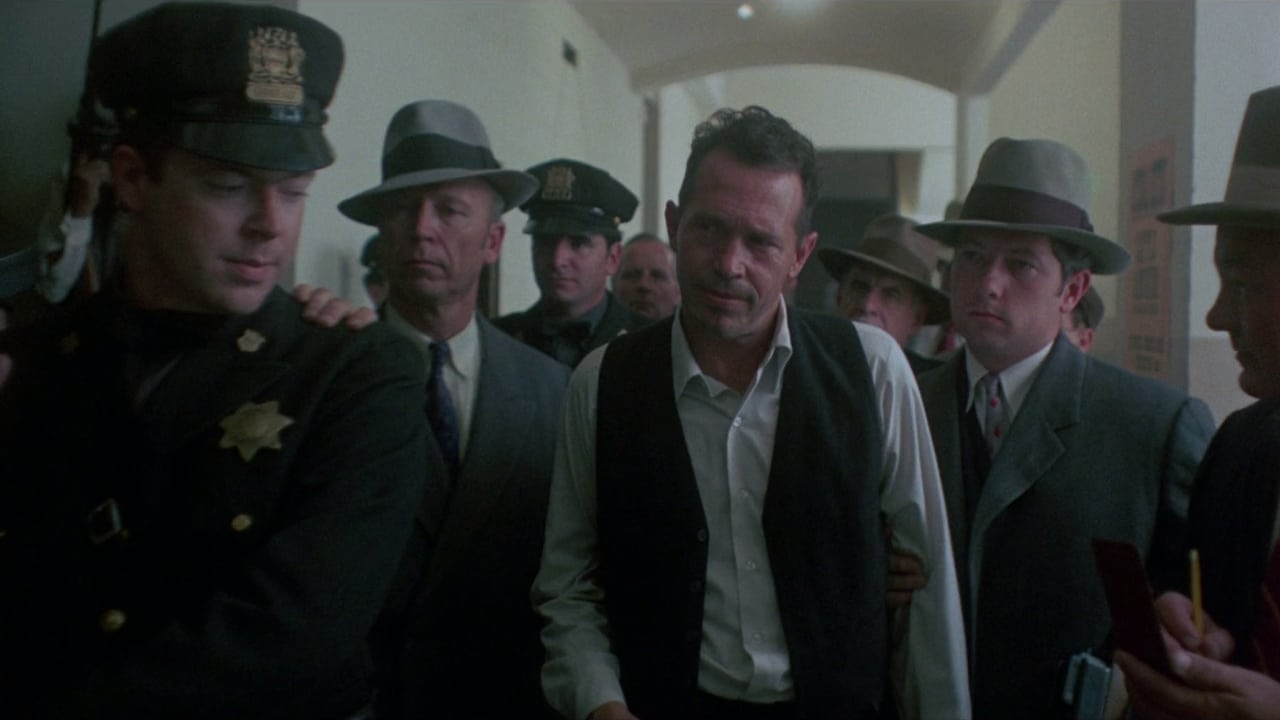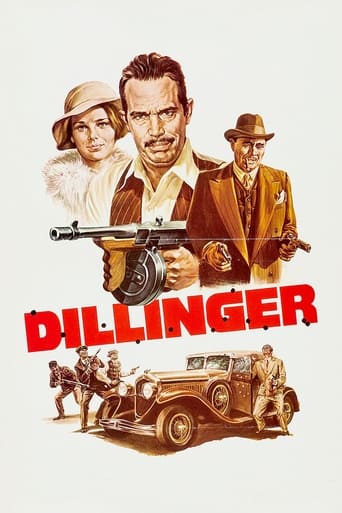

This is How Movies Should Be Made
... View MorePlease don't spend money on this.
... View MoreLack of good storyline.
... View MoreOne of the worst ways to make a cult movie is to set out to make a cult movie.
... View MoreAs primarily character actors, you don't get many chances to catch Warren Oates and Ben Johnson at the top of a bill, but they get the opportunity here in this Seventies gangster romp featuring many of the top hoodlum names of the era. My instincts tell me that most of this story was probably fictitious, and without the time or inclination to check out the details, I'll just say that it was an entertaining flick if you go for this kind of stuff.The film opens with an 'Introducing' Michelle Phillips credit, an early picture for the former Mamas and Papas singer. Though third billed right after the nominal stars of the picture, I didn't get a sense that she had a major impact on the story, even though she wound up as John Dillinger's (Oates) moll following his virtual kidnap of her in a run down barroom. She certainly didn't find herself in league with the era's infamous Bonnie and Clyde pair, though she did manage to squeeze off a few effective machine gun rounds in the latter part of the story.There's some interesting casting for Dillinger's associates, folks like Harry Dean Stanton as Homer Van Meter, Geoffrey Lewis as Harry Pierpont, and a young Richard Dreyfuss aptly chosen as Lester 'Baby Face' Nelson. That scene where Dillinger works over the fresh mouthed Nelson was one of those instances that didn't ring true to me. If it happened, I'm surprised Nelson would have stuck around.The coolest scene in my estimation took place right after Dillinger maneuvered his way out of the Lake County Jail, freeing Reed Youngblood (Frank McRae) and grabbing a guard and the warden for a brief period as hostages. As they make good their escape, Dillinger has his driver pull over so he can rob a bank! That I believe, is what they call chutzpah!
... View MoreDillinger is another example of great 70's American filmmaking. This is a well made pic and when you've got actors of great stature like Oates and Johnson, this somehow guarantees you're in for a great ride and the strong performances don't stop here. Even Dallas's Steven Kanaly as one of Dillinger's gang impresses in what is a very violent film, the likes of a similar film, Boxcar Bertha. Many films have been made of John Dillinger, this one the only one I've seen. Dillinger was one of the most feared bank robbers who just kept robbing. It was in his blood. No way in hell, could you make a guy like this stop. From the movie's start that has him robbing a teller, he pre warns the clerk, as not to get ideas, saying "This is the greatest moment in your life, don't make it your last". Oates depicts a range of emotions of the famous John Dillinger, his flaws, etc. He had a baby like nature, about him, someone who refused to grow up. The same could be said for Richard Dreyfuss who shines, in his much younger days as the smart alecky, cocky, Babyface Nelson, if stealing the scenes from the great Oates, who's performances are always of high accolade quality. Of course, it ends bloodily of course, with his execution out front of a cinema, in front of many shocked public. Dillinger openly admits how his mates wanting out careers, while he wanted to steal people's money, and here again is a prime example of how crime doesn't pay. Kanaly's running, slowly dying scene is memorable.
... View MoreMichael Mann's massively budgeted and heavily promoted "Public Enemies" was somewhat of a disappointment, at least to me personally, and thus I went searching for other cinematic versions of the John Dillinger/Melvin Purvis saga. I quickly came across this biopic and it immediately looked a lot more like my preference. "Dillinger" is an early 70's film (the best era for cinema), with a splendid cast and an incredibly violent character. I don't know why exactly, but back in the seventies they were better at re-creating the desolate and grim 1930's Depression Era than they are nowadays. The atmosphere and scenery used in "Dillinger" feels a lot more authentic than in "Public Enemies", despite the fact this AIP-production probably didn't even cost one tenth to make. The life- story of John Dillinger is well-known. He was an eloquent but dangerous bank robber in the Midwest area during the Depression era, but became particularly immortal when he was declared public enemy number one by the FBI and idolized by the newspapers and media. Dillinger always collaborated with loyal and almost equally infamous partners (Homer Van Meter, Harry Pierpont, Baby Face Nelson, Pretty Boy Floyd) and wasn't ashamed to make public appearances with his girlfriend Billie. Melvis Purvis, head of the Chicago bureau and right hand of FBI boss J. Edgar Hoover, devoted himself to capturing and killing Dillinger and his gang. The film is narrated in a more or less chronological order, with the emphasis lying on Dillinger's ego and Purvis' personal vendetta. Most of the criticism towards "Dillinger" comes from people claiming the script, penned down by director John Milius, isn't always fully accurate. Probably so, but this merely concerns unessential details and – besides – if all movies based on true stories would be 100% accurate, they would be called documentaries instead. I believe the facts are only slightly altered and that strictly for entertainment purposes. The bank robberies and shootouts naturally form the highlights of the movie. They are quite extended and very, VERY violent. Multiple cops and robbers are literally perforated with machine gun ammunition and John Milius blatantly depicts the bloody carnage of these battles. The soundtrack is great and very apt, with "The Gold Diggers' Song" and "Happy Days are Here Again". The casting is extraordinary. With his rough looks and almost naturally criminal charisma, Warren Oates is the best imaginable choice ever to play John Dillinger. If you look up some pictures of the real John Dillinger, you'll be stunned by the resemblance he bears with Warren Oates. I love Johnny Depp and all, but this role belongs to Oates forevermore. Ben Johnson is terrific as FBI man Melvin Purvis and Michelle Phillips (1/4th of "The Mamas and the Papas") is quite convincing in her film debut as the love-interest Billie. Furthermore there are several fantastic supportive roles for Harry Dean Stanton (one of the most underrated actors ever) as Homer Van Meter, Geoffrey Lewis as Harry Pierpont and a very young and hardly recognizable Richard Dreyfuss as the ill-tempered and nasty Baby Face Nelson.
... View MoreG-man Melvin Purvis (Ben Johnson) chases bank robber John Dillinger (Warren Oates) high and low, in this Depression-era action flick that's heavy on gunfights and short on character development. Throughout the film, a herd of other public enemies, including Harry Pierpont, Homer Van Meter, Baby Face Nelson, Pretty Boy Floyd, among others, stampede the plot, diverting us away from Dillinger the man. It's as if all these hoodlums suddenly exploded on the scene, without benefit of a childhood or motivation of any kind, and one of these hoodlums just happened to be Dillinger.Multiple shootouts go on and on and on. Bang, bang, bang ... dying bodies jerk, squirm, twitch, and lurch, with lots of blood. Antiquated autos zoom away at twenty miles an hour, tip over, crash, and blow-up. And Purvis smokes lots of cigars.Another irritation is the casting of Warren Oates. He looks way too old to play Dillinger. An unknown, younger actor would have been more convincing.On the other hand, the film's color cinematography and terrific production design create an authentic 1930s look and feel, helped along by era songs, like "Red River Valley" and "Happy Days Are Here Again". The outdoor scenes, especially, with those dirt roads and cheap frame rural houses, convey a dreary, lonesome, forlorn mood, totally in keeping with the poverty and hopelessness of that period.My impression of this film is similar to that of the more recent Dillinger film "Public Enemies" (2009). Both films lack focus on Dillinger. Both get carried away with action. And both do a great job with the Depression-era style. That is to say, in "Public Enemies" and in "Dillinger", the strength is the visuals; the weakness is mainly the script.
... View More